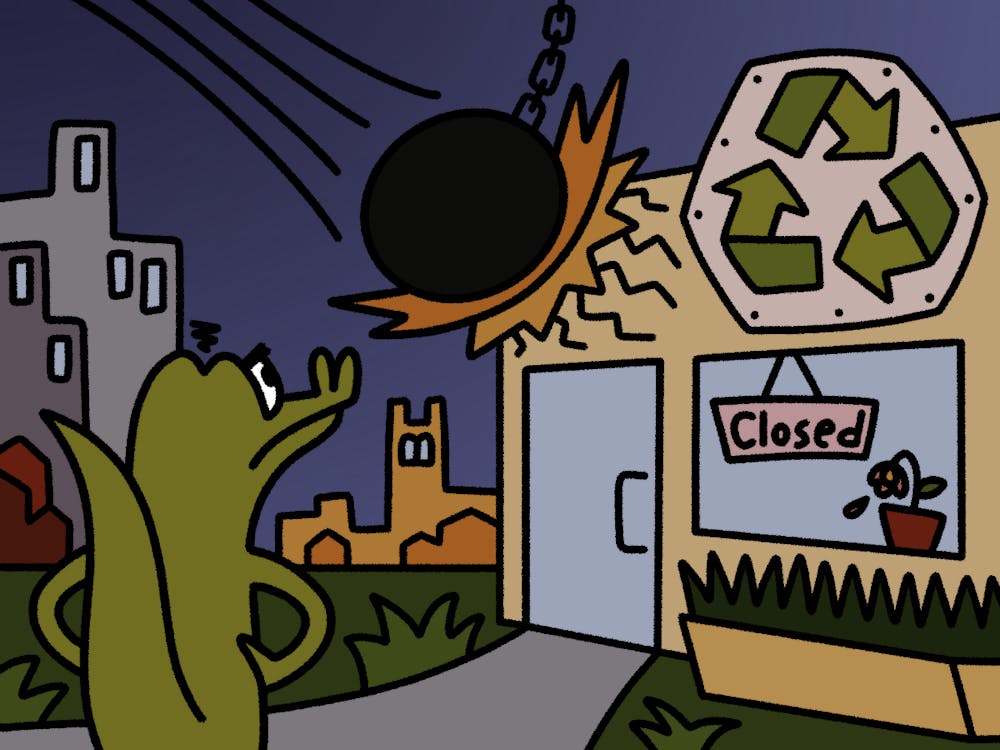UF closed its Office of Sustainability after almost 20 years of service Aug. 4, citing a focus of efficiency.
The university argues sustainability is already embedded in its practices. But not everyone is buying it.
Three employees were fired due to the office’s closure. The office was responsible for implementing sustainable practices across UF, including following green building standards, advising the UF Procurement Department and tracking sustainability metrics for national rankings. It also offered biodiversity and communications student internships positions.
The Office of Sustainability was absorbed into UF Facilities Services, but it’s unclear who will enforce some of the office’s responsibilities, like implementing UF’s Climate Action Plan and tracking sustainability efforts.
UF spokesperson Cynthia Roldán said in an email the office was closed due to a 5% budget cut in administrative expenses starting July 1. The cut saved the university $20 million, she said, and approximately 75 positions were eliminated across affected departments.
“While these decisions were difficult, they were critical to minimizing the impacts to the campus community to the greatest extent possible,” Roldán wrote.
Provost Joe Glover, in a Faculty Senate meeting Aug. 21, said he understood the office could close and “not lose any of the functions that it had historically been providing.”
The office, he added, had few core functions left, by his understanding.
“It seemed like a reasonable cost containment effort at that point with no loss of functionality,” Glover said.
But Stephen Mulkey, a UF biology professor, said he feels the decision was politically driven more than anything else.
“ It's not necessarily the efficiency of the office,” Mulkey said. “They don't want this office there.”
If there is an efficiency justification for closing the office, Mulkey said, then there should have been an audit. That’s when leadership could step in, make a plan to renovate and address issues to make the office more relevant and efficient, he added.
“ But none of that happened,” Mulkey said. “The choice was, ‘we're just gonna close this f-ck-r, we're just gonna shut it down.’ I'm sorry, that makes no sense to me.”
The functions
Meghan Fay Zahniser, the executive director of the Association for the Advancement of Sustainability in Higher Education, said the nonprofit works with higher education institutions that are interested in learning about or working on sustainability.
UF has been a member of AASHE for almost 20 years, she said. It's fair to say UF has been deeply committed to sustainability, Zahniser said, but the Office of Sustainability’s closure was concerning to her.
“This is a first that I've heard of, to my knowledge, where an institution has eliminated their Office of Sustainability,” she said.
Not every institution has an office for sustainability efforts, she said, but the past two decades have generally shown growth in sustainability staff positions. Zahniser said she’s hopeful UF can continue to build off the Office of Sustainability’s impact and legacy.
“I am curious to see what that looks like without this office,” Zahniser said.
UF’s history with sustainability goes as far back as 1994, when it joined 310 universities worldwide in signing the Talloires Declaration, pledging support to reduce environmental degradation and natural resource depletion.
It continued with efforts like creating a Sustainability Task Force jointly with the current UF president and Faculty Senate in 2001. It established a Sustainability Committee in 2004 to oversee and develop policies with the Office of Sustainability, and assess the progress of UF’s sustainability efforts.
UF geological sciences professor Andrew Zimmerman has been a member of the committee for nine years.
When he heard the Office of Sustainability closed, Zimmerman said, he reached out to the whole committee encouraging them to fight for the office’s reinstatement. The university didn’t consult with the Sustainability Committee or faculty governance before shutting down the office, he said.
“ This was, in a sense, done behind everybody's back,” he said.
The office ran UF’s recycling program and gathered data about UF’s greenhouse gas emissions, he said. It also had a representative in various UF committees and departments to advise on sustainability.
It’s not clear who will be responsible for continuing to submit data to AASHE, he said, and he thinks initiatives like gas reduction and carpooling will “fizzle away.”
“ I mean, there's nobody who can devote themselves that kind of time and effort,” Zimmerman said. “ Certainly there'll be a bigger need for what we do, but we're just all faculty with other jobs, so it'll be difficult.”
The Sustainability Committee, in large part, made suggestions to the Office of Sustainability, he said. The office’s closure takes away a huge chunk of the committee’s role.
“We don't have any facilities. We don't have any budget,” Zimmerman said. “So nothing will get done sustainability-wise anymore.”
UF’s sustainability future in question
Dave Newport, the director of the Office of Sustainability when it was originally founded, said he was heartbroken to find out about its closure.
“ To see it pulled for no good reason in the dead of night when nobody's on campus, like students and faculty, just [portrays] that the university is not really proud of this,” Newport said. “And I understand why. They shouldn't be.”
The Office of Sustainability worked with the UF president to make sustainable practices a priority, Newport said. The office worked to embed sustainability concepts and practices into UF’s curriculum, he said.
According to Newport, it’s essential the office works as an administrative entity and is “close to the top.” And without being embedded institutionally, he added, it’s a signal that it’s not important to the university.
The highest UF’s sustainability metrics have been rated according to AASHE standards is a silver STARS rating, the third highest an institution can get, he said. The key process indicators like recycling, energy, transportation use and curriculum shows UF still has room for improvement, he said.
“ UF is not a leader like some schools are in this,” Newport said, “and this is a place where UF should be a leader and can be a leader.”
The Office of Sustainability was in charge of implementing UF’s Climate Action Plan, or CAP, which it adopted in 2009 at the recommendation of a group of UF staff and faculty. The plan focused on infrastructure energy efficiency, expanding greenhouse gas emission monitoring and reduction campaigns, according to previous Alligator reporting.
The CAP was supposed to be revised and updated every three years, but its second edition, CAP 2.0, wasn’t drafted until 2021. The new plan aimed to improve university’s energy consumption, promote low-carbon transportation and establish guidelines for sustainable building.
CAP 2.0 adoption and implementation was paused in 2023 to allow the incoming president to review and evaluate institutional priorities, Roldán, the UF spokesperson, said in an email.
“No one department or division is tasked with implementing sustainability principles because they have already been integrated into the institution’s regular business practices,” she said.
While CAP 2.0 has not received formal review and approval, UF has not wavered in its commitment to building and operating a more sustainable campus, Roldán said.
In February 2024, the Alachua County Board of City Commissioners sent a letter to former UF president Ben Sasse encouraging the university to adopt the new CAP and to “take proactive measures in line with its position as a leader in climate science.”
Community impact
Grace MacEwan, director of Unlitter UF, a sustainability-focused student organization, said she was disappointed to see UF decide to close the Office of Sustainability.
UF has several sustainability degree programs, and the 21-year-old UF sustainability senior said she thinks shutting down the office shows the university doesn’t understand the importance of what it's studying. It’s a disappointment for students like herself who were thinking of continuing at UF to get a masters in sustainability, she added.
“Who knows if that major is even gonna be around in a few years,” MacEwan said. “This could just be the first step if they shut down the office of sustainability.”
She said Unlitter UF will continue to do cleanups around campus and try to make both the university and Gainesville a more sustainable place.
Several UF sustainability clubs publicly condemned the Office of Sustainability’s closure in an Instagram post. The office was critical to UF’s climate response, it read, and it served the community through multiple environmental initiatives and student programs.
“While this closure may serve UF’s short-term fiscal objectives, it undermines long-term savings, community needs, and the university’s reputation,” the post read.
It's more important than ever to support sustainability efforts, and it’s now up to the community to represent sustainability on campus, it said.
Alexander Hoff, a 21-year-old sustainability and the built environment senior, said he wasn’t surprised when the Office of Sustainability was closed.
“The board's been a little bit more, you know, kind of stingy on what they wanna spend money on and the messaging of what they wanna spend money on,” Hoff said.
He thinks the office’s closure is going to impact awareness about sustainability. The Office of Sustainability had partnerships with different organizations, he said, and it put on sustainability-centered events.
UF closing the Office of Sustainability because of "fiduciary irresponsibility” isn’t enough of a reason to close the office, he said.
“ I think wording like that kind of associates the idea or the concept of sustainability as also being irresponsible in the eyes of this board,” Hoff said.
Summer Smith, a 20-year-old natural resource conservation junior and the outreach director of Unlitter UF, thinks the university has done a lot of work to involve students in the process for decisions that impact them, and Smith thinks it was intentional that UF didn’t involve students in this one. Smith said she thinks it was so people wouldn’t have an influence on the decision.
“ You learn this in economics, but everyone values the present more than they value the future,” she said, “so you're willing to pay more for now than you are to pay less for later.”
Closing the Office of Sustainability might be a way of solving financial problems in the short term, she said, but UF needs to focus more on the future.
“ It's important that it's protected so it can protect us,” Smith said.
Contact Maria Avlonitis at mavlonitis@alligator.org. Follow her on X @MariaAvlonitis.

Maria is the Fall 2025 university editor of the Alligator. She previously worked as the university administration reporter Summer 2025. Maria enjoys walking her dog, and on the rare occassion she has free time, she loves attempting to garden and salsa dancing.





